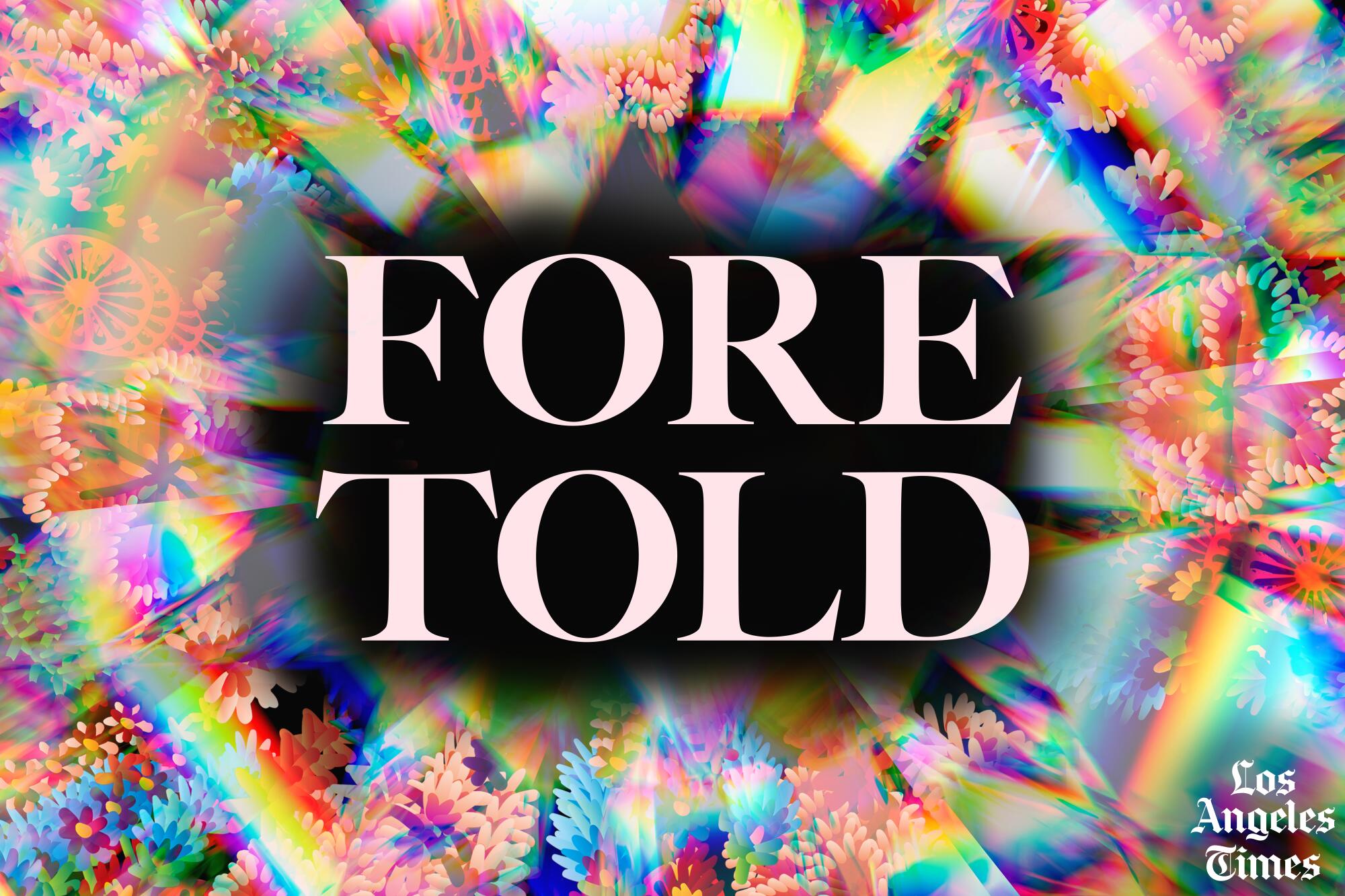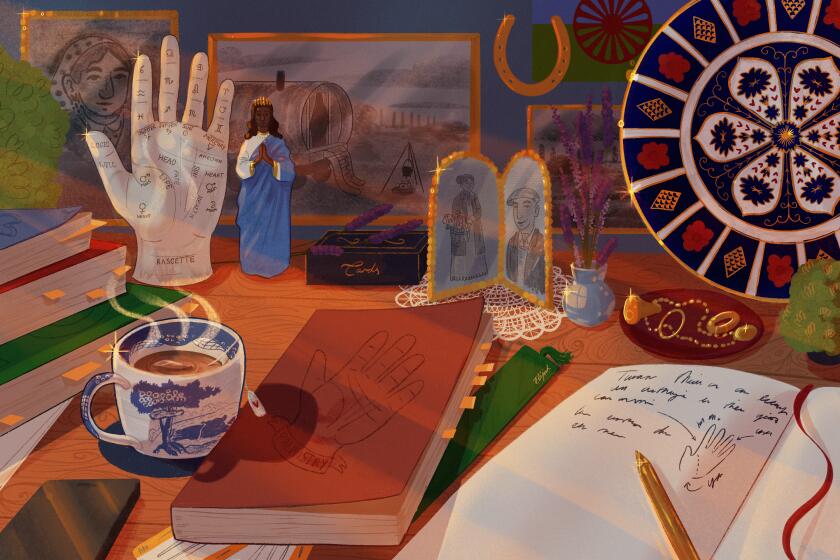
- Share via
Follow 'Foretold' wherever you get your podcasts:
Episode 7: “A Prism.” In the beginning, Faith thought Paulina was giving her a hot news tip about psychics and scams. Years of investigation revealed something else.
Read the episode transcript.
See all episodes and extras.

By the time I made it back to Mexico in December 2010, I had already missed a lot of my tía Martha’s last few months of life.
She had breast cancer and had gone through several rounds of chemo and a double mastectomy. She was eating the healthiest, most organic raw diet possible and taking conventional and homeopathic medicine between naps. But it wasn’t enough. Her cancer had spread through her whole body. There was nothing more we could do.
I flew to her directly from my study-abroad semester in France and walked into her room, where she was propped up on pillows, coughing blood. I tried to cheer her up by showing her all the fancy hats I had bought for her. “Que linda!” she said as she tried them on. She loved how they looked but handed every hat back to me, dejected. She knew she wouldn’t live long enough to go out and wear them.
That night, my mom brought in a disheveled-looking stranger who said he was a brujo. In Mexico, that’s effectively a catch-all term for those who practice any kind of non-Catholic spiritual healing rituals, be they indigenous healers or fortunetellers. And this guy’s dirty backpack was a grab bag of spiritual rituals. It bulged with tarot cards, crystals, a Bible, feathers, rosaries and shards of glass.
I was surprised and a bit put off that my mom had brought him home from the tianguis, the open-air market. If anything, I’d have expected her to bring a priest — not that I’d have been excited to see him either. I was 20 years old and deep into my angry young adult atheist phase. I had grown up Catholic in Santa Cruz, a California hot spot for new age-y hippies; by the time I was in college I had already rejected both Catholicism and new age spiritualism. I thought everything that wasn’t scientifically proven or logically evident was hot garbage.
And like a lot of insufferable rebelling college students, I was vocal about that. So as this man gave tarot readings to every member of my family, I watched intently, looking for ways to debunk him. When it was my turn, he instantly knew I was a skeptic. He stroked my ego a bit and called me a free thinker, but I wasn’t going to let flattery sway my opinion that all this was a waste of time. He tried, but ultimately I got nothing out of the experience, and he left.
My whole family had a bit more energy than usual that night, even my tía Martha. Everyone was talking about their interpretations of what the cards told them about themselves and their future. They were comparing notes, reflecting on their memories, even joking about changing careers or moving. Everyone was having a good time. Everyone but me.
When I think back to that night, I have a different perspective on why my mom brought in this brujo. As a scientist herself, I’m sure she didn’t think he could change the fact that my aunt was dying in front of us. But she was searching for hope, and that’s what he offered. My angsty 20-year-old self would have called his practice emotional manipulation at worst, a placebo at best. But what did that matter? My family needed something to believe in, if just for one night of relief.
And wasn’t that worth paying for?
Well, that depends on how much you are paying and whom you ask. To 20-year-old me, any amount of money was too much for a reading. To 32-year-old me, I could see the value in paying; it’s not like we skimped on her care to afford this session.
The value of this kind of spiritual practice is in the eye of the beholder. If you feel you didn’t get anything out of it, then you didn’t. If you feel you did, then you did. There is no way to prove it either way.
There is danger in opting for a spiritual practice rather than a medical one. But my family didn’t hire a brujo instead of turning to evidence-based cancer treatments. It was supplementary. And he gave my tía the opportunity to reflect on her life in a joyful way — not just on her impending death but also on the whole meaning of her life.
Fortunetellers and other spiritual advisors are in the business of selling human connection and opportunities for introspection. And it’s possible to benefit from those even if there’s nothing metaphysical going on.
That said, it’s still a business. And when money changes hands, that can muddy people’s motivations and open the door to exploitation.
Spiritualist and filmmaker George Eli acknowledges that some of his colleagues might focus too much on the money and not enough on the spirituality.
There is a market for telling people what they want to hear. ... A lot of clients come to me and said they went to a psychic, and they paid thousands of dollars a month, and they never really got anything out of it.
— George Eli in “Foretold”
But George is a true believer in his practice, and he says plenty of cynics he knows — even other Romani people — are actually true believers as well.
That’s the hardest part to wrap my head around. If a fortuneteller believes in their practice and acts in good faith and the client benefits, what’s the problem? Why is there such scrutiny on this spiritual practice — more than on, say, astrology, motivational speaking and meditation retreats?
That seems like racism to me. ... I don’t know every individual case. I don’t. But I know that when one or two cases come up every three, four, five years, it is so in the press. So that’s racism.
— George Eli in “Foretold”
— Jazmín Aguilera

Go even deeper
“I would not exist if my ancestors had not practiced Drabarimos,” or spiritual medicine, George Eli writes. The Romani spiritualist delves into how he got into his line of work and why his community and heritage have become so misunderstood.
Romani spiritualists face negative stereotypes about our practices. But our traditions have deep roots and have sustained us for centuries.
More to Read
About 'Foretold'
Theme music by seven-string guitarist and composer Vadim Kolpakov and composer Alex PGSV. Additional original music by Vadim Kolpakov and Alex PGSV, as well as Alex Higgins. Fact checking by Kasia Broussalian, David Toledo Diaz, Lauren Raab, Asal Ehsanipour and Faith E. Pinho. Additional research by Scott Wilson.
Thanks to Shani Hilton, Kevin Merida, Brandon Sides, Dylan Harris, Carrie Shemanski, Kayla Bell and Nicolas Perez.




